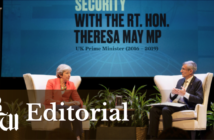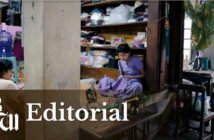The crisp, withered leaves splinter beneath your feet, a satisfying crunch reverberating with each successive step. Your cloak slithers lazily in your wake, your pointed black hat lying askew across your forehead, your face painted an acidic shade of green.
Your fingers desperately clutch the handle of a hollow, plastic orange pumpkin crammed with an assortment of the usual hyperactivity inducers. Reeses cups. Twix bars. Dum-Dums, Jolly Ranchers and Starbursts. Your friends, dressed as vampires, demons and ghouls, laugh giddily beside you through the holes in their masks. You’d laugh, too, if your jaws weren’t cemented together with a Milk Dud cluster.
The allure of trick-or-treating may now seem far behind us. But truth be told, many of us still hide behind masks — of a different variety, perhaps, and for a different reason.
Consider the First Amendment to the Constitution, which guarantees us the freedoms of religion, speech and the press. It also reserves our rights to peaceably assemble and petition the government for a “redress of grievances” – essentially, to voice complaints about governmental behavior. It is a series of rights that few other countries ensure, not to mention a series that we often take for granted. Still, many of us certainly do exercise our access to such rights with abandon.
But should there be a limit to how far these freedoms extend?
In some cases, there is. Freedom of speech is likely the most ambiguous of the five, and it is often regulated by policies against copyright violation, slander, hate speech and the like. By nature, many of us additionally tend to self-regulate our speech, particularly when our good names and reputations are on the line.
With the advent of the Internet, however, we gained access to speech sans consequence.
Christopher “moot” Poole, the founder of uncensored online imageboard 4chan, is one unabashed proponent of online anonymity.
“Communities like 4chan…are raw, they’re unfiltered,” Poole stated in his 2010 TED Talk. “And sites like it…are endangered because we’re moving toward social networking. We’re moving toward persistent identity. We’re moving toward a lack of privacy. We’re sacrificing a lot of that, and I think in doing so…we’re losing something valuable.”
Indeed, anonymous speech, especially online, can be instrumental in helping us express our true selves without fear. Take, for instance, members of the LGBT community who have anonymously found online support systems; assault or rape victims who have used anonymous forums to discuss and process their traumatic experiences; or social movements that have been organized by masses of people operating under pseudonyms.
But the democratizing nature of anonymous speech has a far darker alter ego.
“The downside to anonymous speech, particularly the online variety, is that it can become a tumultuous hive-mind of surly, racist, misogynistic, pornographic filth and politically incorrect doggerel,” Llewellyn Hinkes-Jones writes in The Atlantic.
Poole himself admitted to the less family-friendly dimensions of 4chan, stating “if it exists, there is porn of it” on the site. But Internet users have taken anonymous sites to an even more deeply personal level.
Use of platforms like Formspring, which allows users to create a profile and others to post anonymous comments to it, has had heartbreaking consequences. In 2001, 14-year-old high school freshman Jamey Rodemeyer committed suicide, an act that investigators tied to his history with in-person and online bullying, ABC News reported. Entries on Rodemeyer’s Formspring profile, according to ABC, included “JAMIE IS STUPID, GAY, FAT AND UGLY. HE MUST DIE!” and “I wouldn’t care if you died. No one would. So just do it 🙂 It would make everyone WAY more happier!”
What a twisted, diseased notion of happiness.
“Kids are mean, and it’s because they’re trying it out,” comedian Louis C.K. told Conan O’Brien in 2013. “They look at a kid, and they go, ‘You’re fat.’ And then they see the kid’s face scrunch up, and they go, ‘Ooh, that doesn’t feel good to make a person do that’…but when they (anonymously) write ‘You’re fat,’ they just go, ‘Mmm, that was fun. I liked that.’”
Our tangible identities clearly help define who we are. But so does our behavior when we’re not associated with any identity. The ability to act behind the protective veneer of a screen — and a screen name, for that matter — enables us to ignore the psychological repercussions of our actions on both ends. But that’s something we should cease to brush aside.
Anonymous speech is a right that we all too often use for hate.
A treat that we all too often use for tricks.





Comment policy
Comments posted to The Brown and White website are reviewed by a moderator before being approved. Incendiary speech or harassing language, including comments targeted at individuals, may be deemed unacceptable and not published. Spam and other soliciting will also be declined.
The Brown and White also reserves the right to not publish entirely anonymous comments.